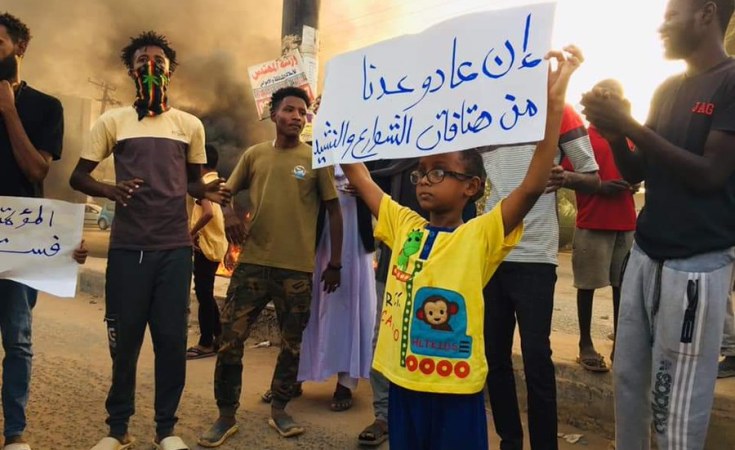Amid the lack of official support, Sudanese are relying on the help of fellow citizens to flee. Meanwhile, a new humanitarian crisis is unfolding near Egypt. DW spoke to Sudanese refugees in neighboring countries.
Earlier this week, Nidal from Sudan's capital Khartoum, couldn't take it anymore.
"The militia was hiding in our building and the Sudanese Army attacked them," the 29-year-old mother, who asked not to reveal her last name due to safety reasons, told DW on the phone.
"We decided to wait for a break of the shooting, grabbed our daughter, a bag with our passports and university degrees, and ran," she recalls. Then, her voice breaks. "We left everything behind, our home, our friends, my family, my laptop with all our photos."
First, the family ran to a neighborhood which was less contested. From there, they took a bus to the village Gallabat at the border crossing with Ethiopia. When they crossed into the Ethiopian border village Metema, they were welcomed with food and shelter.
"Here I feel safe," Nidal says, but "we don't really know what we should do now." Meanwhile, her traumatized three-year-old daughter keeps asking her why the people shot at them and "why we can't go home," says Nidal.
No official help line
Since the outbreak of the clashes between the Sudanese Armed Forces under the lead of General Abdel-Fattah Burhan, and the leader of the paramilitary Rapid Support Forces (RSF), Mohammed Hamdan Dagalo, also known as Hemeti, in mid-April, thousands of internationals have been successfully evacuated by airplanes.
Sudanese civilians, however, rely on themselves and on the support of democratic grassroot groups, who coordinate aid and information via WhatsApp groups and social media.
"Sudanese are using social media to share information on the routes they have taken, warn of challenges and restrictions to help their fellow citizens make decisions," Michelle D'Arcy, Sudan country director of the Norwegian People's Aid organization, told DW.
"One of the key challenges is access to cash in the current situation with banks closed and even other ways to send money not functioning," she says, adding that "the costs of food, fuel and transport are skyrocketing."
Twitter users report that bus tickets from Khartoum to the border with Egypt now cost up to $400 (Ꞓ363). This is 10 times the usual price.
As a result, not everyone who would like to leave the country, is simply able to pack up and go. "Movement is not possible for all, and it is a difficult choice for Sudanese to make. There are risks both to stay and to travel in the current situation," D'Arcy says.
Unfolding humanitarian crisis
According to the International Organization for Migration, IOM, some 3,500 people had crossed the Sudanese border into Ethiopia by the end of this week. Chad's authorities report around 20,000 Sudanese refugees, and South Sudan says it has taken in around 5,500 mainly South Sudanese people.
Meanwhile, Egypt's Foreign Ministry stated that 16,000 people had crossed its border. Meanwhile, Sudanese on the ground are warning of a growing humanitarian catastrophe with thousands of people waiting to enter.
Mohamed Adam, a 21-year-old medical student, told the British newspaper The Independent that they had been waiting for almost 36 hours in 40 degrees Celsius (104 degrees Fahrenheit) heat without access to water or food at the border with Egypt. "People are extremely stressed," he said.
"One of the tragedies [of Sudan's current conflict] is happening on the Sudanese-Egypt border, where even those who have British passports have been denied a visa to enter Egypt," Sami Hamdi, managing director of the London-based consulting firm The International, told DW.
He believes that the underlying reason is Egypt's current economic crisis. "Egypt will use the situation to leverage for international finances and international support or it will block the entry," he said.
Sudanese in Libya
Meanwhile, the situation in neighboring Libya is somewhat different. Here, it is not the lack of visas that keeps Sudanese civilians from entering but security issues in the country's south. The region is in the hands of gangs who are known for kidnapping, smuggling weapons and hosting militants.
This is the reason why Isaac, who asked to be identified only by his first name for safety reasons, has told his wife to stay put in Sudan despite the fighting. "I am too worried about the human traffickers on the Libyan-Sudanese border," he told DW in a cafe in downtown Misrata.
Since the outbreak of the clashes, he has been meeting other Sudanese here every evening after work to watch the news on a giant TV screen.
"My father was killed in the current fighting, and now my two young brothers are left alone," Fadel Shawkat, who moved from Sudan to Libya in 2019, told DW. "I haven't been able to get in touch with them," the 42-year-old said.
But as much as he wants to get his brothers into Libya, the journey might be too dangerous and difficult. First, they would have to travel to the border with Libya, and then they would have to make it through Libya's south. "I don't know anyone who would take them to the border," Shawkat said.
He, like the other Sudanese in Libya, don't expect any help from the Sudanese government or their host country, a view that is confirmed by analyst Hamdi.
"Libya, Egypt, Chad, Ethiopia, Somalia, everyone is watching with great concern as to what's going on in Sudan but for the regional powers, it will be less about resolving Sudan and more about trying to make sure that they don't suffer from the crisis even if that means shutting off Sudan as opposed to helping it."
Edited by: Rob Mudge


